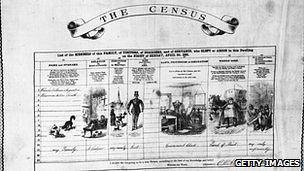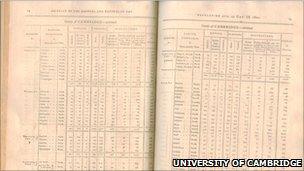Census: 'Jedi knights' and 'man traps'
- Published

A census form from 1881 depicting people at various stages of life
People taking liberties with their census answers is nothing new, according to researchers at Cambridge University.
While "Jedi knight" was a popular choice of religion in the last census, equally frivolous answers were recorded in the 19th Century.
A baker, for example, was registered as "master of the rolls and burn crust".
Dr Stephen Thompson and Dr Peter Kitson said historical census data revealed both vast changes in society and some amusing similarities.
Dr Kitson and his team came across what he described as "these bizarre job titles" while researching British occupations from the late medieval period to the early 20th Century.
Using both parish records and data collected since the first census in 1801, he said he was amazed that some people showed the same disregard for data collection then, as they do now.
'Cabbage gelder'
Knowingly giving inaccurate information on the 2011 census can result in a fine, but a 19th Century minister had no such worries when he filled in records for the parishioners of Middleton, in Norfolk.
The Very Reverend Dr Peter Scrimshire Wood registered a butcher as a "cut throat of pigs" and a greengrocer as a "cabbage gelder".
He also listed mothers of illegitimate children as "whore and man trap".
Whether he was doing this for his own amusement, or his records reflected his low opinion of the villagers, is unclear.
"But I actually laughed out loud," said Dr Kitson. "I was so happy to be sharing a joke with someone who lived 200 years ago and was clearly trying to enliven the tedium of record-keeping."

Results for Cambridgeshire from the 1801 census, which asked only six questions
Ministers such as Dr Wood, together with local farmers and employers, were charged with filling in details for the first censuses because the population in the early 19th Century was largely illiterate.
'Important insights'
Dr Stephen Thompson, a researcher in social and population history at the University of Cambridge, has spent six years analysing census data.
"Studying the 19th Century census can give us important insights into how statistics came to dominate modern political debate," he said.
He described the first census of 1801 as "the most ambitious data-gathering exercise ever undertaken by the British government".
Prompted by a poor harvest, a manufacturing recession, large-scale unemployment and public protests, Parliament passed a bill enabling it to ascertain the exact population of Britain.
The resulting census was championed by Cornish MP, Charles Abbot.
"He argued that a national headcount would enable the government to plan the distribution of grain supplies more effectively," Dr Thompson explained.
Last census
The results gave the authorities a clear idea of who and what they were dealing with - a population of around 10.9 million people, one in nine of whom received poor relief.
It also informed a number of important discussions including taxation and welfare reform.
However, Dr Thompson explained that the data took so long to collect and analyse that the country's grain crisis was over by the time the results were available.
That data was enough to fill just two bound volumes, but had to be painstakingly collated and hand-written by parliamentary clerks.
Twenty-one censuses later and the contrast could not be greater. The 2011 census details are expected to cover 600 million sides of A4 paper.
It may, however, be the last census the country sees.
The Office of National Statistics is considering what it says will be new and more effective ways of gathering statistical data on the British population.
So, "Jedi knights" and "man traps" may well be consigned to history.
- Published1 February 2011